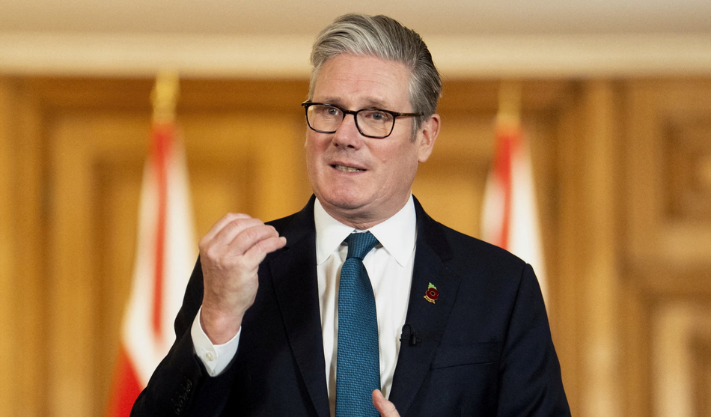“We’re Leading the Way”: Starmer Defends Green Economy Plans Ahead of COP30
Prime Minister Keir Starmer has said that the UK will take the lead in fighting climate change, even though some critics are asking him to slow down. He believes moving to a greener economy will help lower energy bills, grow the economy, and bring positive change to the country.
Starmer made these remarks before heading to Brazil for the COP30 climate conference, where world leaders will meet to discuss action on global warming. The UK leader said he wants Britain to be seen as a country that takes real action, not just talks about it.
“Britain isn’t waiting to act – we’re leading the way, as we promised,” Starmer said. “Clean energy doesn’t just mean energy security so that Putin can’t threaten us – it means lower bills for working families across the UK.”
Focusing on the Green Economy
Starmer is expected to announce new investment in green energy and low-carbon industries, aimed at speeding up economic growth and creating jobs. The UK’s green economy is currently growing three times faster than other sectors.
In Brazil, Starmer plans to meet with other leaders and business groups to encourage more investment in Britain’s clean energy sector. His government has already attracted £50 billion in clean energy investment since the last election, and he said more is on the way.
According to Starmer, investing in clean energy is not just about protecting the planet but also about rebuilding the economy. “Critics who say climate action cannot boost the economy are completely wrong,” he said. “We’re delivering jobs and opportunities now and for generations to come. That is national renewal.”
Tensions Over Forest Fund
However, Starmer’s visit to Brazil could be uncomfortable. The UK government has decided not to join Brazil’s new tropical forest fund, at least for now. This decision may cause tension with the hosts of COP30.
The fund, known as the Tropical Forests Forever Facility (TFFF), is a major project supported by Brazilian President Luiz Inácio Lula da Silva. Lula hopes it will be the main achievement of COP30. The TFFF aims to raise $125 billion (£96 billion) for projects that protect forests in countries like Brazil. About $25 billion would come from governments and public institutions, while the rest would come from private investors and financial markets.
The goal of the TFFF is to preserve existing forests and reward governments and local communities that protect them, instead of cutting them down for short-term profit.
The UK government has said the fund is still in its early stages, and it wants to see proof that it works before contributing money. Some experts have also expressed concerns about how the fund is structured, but they believe those problems can be fixed.
Starmer’s choice not to support the TFFF could also cause awkwardness for Prince William, who is currently in Brazil to present the Earthshot Prize. The TFFF is one of the projects nominated for the award.
Balancing Politics and Climate
Before the trip, some of Starmer’s advisers had suggested he skip COP30 altogether. They feared his attendance could make him a target for the Reform Party, which has been critical of climate policies and denies climate science. The Reform Party wants to abandon the UK’s pledge to reach net zero carbon emissions by 2050.
Despite this, Starmer decided to attend the conference. He wants to send a clear message that green growth is good for both the environment and the economy. For him, tackling climate change is not a burden—it’s an opportunity to make Britain stronger.
He argues that moving toward renewable energy like wind, solar, and nuclear power will protect the UK from global energy shocks and reduce dependency on fossil fuels. “Clean energy means lower bills, new jobs, and stronger communities,” Starmer said.
The UK’s Climate Commitments
The UK has one of the strongest commitments to reducing greenhouse gas emissions in the world. Its targets are tougher than those of many other major economies, some of which have not yet set clear plans to move to a low-carbon future.
For example, China has set goals that many experts say are too weak, although the country often exceeds its targets once it begins implementation.
In contrast, the European Union (EU) has struggled to agree on its next climate targets. After months of arguments among member countries, the EU finally decided on a plan to cut emissions by between 66.25% and 72.5% by 2035, compared with 1990 levels. The long-term goal is to achieve a 90% reduction by 2040.
However, several green groups have criticized these EU targets as too weak, saying they will not be enough to prevent dangerous levels of global warming.
Climate Leadership and National Renewal
Starmer believes the UK can play a leading role in showing the world that economic growth and climate action can go hand in hand. He wants Britain to prove that investing in clean energy, technology, and innovation can strengthen the economy while helping to save the planet.
Under his leadership, the government has already supported projects that promote wind power, hydrogen fuel, and electric vehicles, and is exploring carbon capture and storage technology. These projects are designed to create thousands of jobs across the country and make the UK less reliant on imported energy.
Starmer often links his climate message with his broader theme of national renewal — rebuilding Britain’s economy, infrastructure, and public services after years of slow growth. For him, climate action is a central part of that mission.
“By investing in clean industries, we can rebuild the economy and secure our future,” he said. “The green transition is not just about saving the planet — it’s about giving people better jobs, cheaper energy, and a stronger economy.”
Looking Ahead
As world leaders gather in Belém for COP30, Starmer hopes to strengthen Britain’s reputation as a climate leader. But his refusal to join Brazil’s forest fund could make it harder to build trust with some partners.
The COP30 conference, which officially starts on Monday, will focus on how countries can meet global goals to limit temperature rises to 1.5°C above pre-industrial levels. Scientists say this is the threshold needed to avoid the worst effects of climate change, such as extreme weather, rising sea levels, and loss of biodiversity.
Starmer’s challenge will be to show that the UK can both lead on climate action and protect its own economic interests. Balancing those two goals will not be easy, especially as he faces pressure from both environmental groups demanding faster action and critics warning against the costs of change.
Still, Starmer seems determined to stay the course. “We made a promise to lead, and that’s what we’re doing,” he said. “The world cannot afford delay. Britain will act — not tomorrow, not next year, but now.”
Published: 6th November 2025
For more article like this please follow our social media Twitter, Linkedin & Instagram
Also Read:
UK Phone companies Boost Security to Stop Fake Caller ID Scams
7 Common Mistakes That Can Damage Your Brain Health
UK Small Business Owner to Face L’Oréal in Trademark Dispute






















